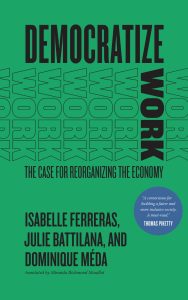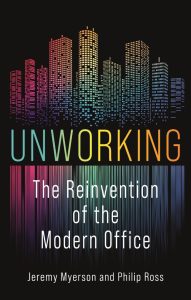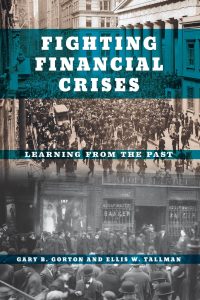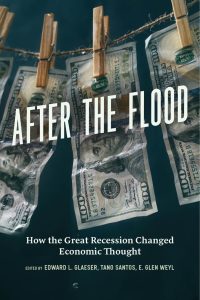Your Labor Day Read & Watch List
The time has come. Flat, blue skies press down overhead, a few eager leaves begin to wither on their branches, and there’s the slightest coolness carried on lazy afternoon breezes that can only mean one thing: summer is ending.
And in its annual death knell, another Labor Day weekend is upon us.
As some of us flee en masse to lakeshores, cookouts, or hunker down in air-conditioned apartments that (for a few days) are just homes rather than hybrid offices, what better way to unwind than by enjoying a good read paired with a good movie?
We’ve put together a list of both Chicago and distributed titles paired with must-watch movies, all focused on the theme of this weekend: work.
Democratize Work: The Case for Reorganizing the Economy by Isabelle Ferreras, Julie Battilana, and Dominique Méda & Sorry to Bother You (2018)
In this collection, a dozen social scientists—all women—explore how we can reform our workplaces to create more egalitarian structures between employer and employee, organization and individual, democracy and economy. By acknowledging that capitalism has outgrown democracy and resolving to treat workers as citizens, Democratize Work articulates how we can right the power imbalance that has soured so many working environments.
A blend of dark comedy, surrealism, and science fiction, Sorry to Bother You centers on young, struggling Cassius “Cash” Green. Cash gets a job as a telemarketer and quickly rises after an older, Black co-worker tells him the secret to success is to use a “white-voice.” The more successful Cash becomes, the closer he gets to the company’s seedy, evil underbelly.
Eventually, Sorry to Bother You descends into a nightmare where Cash is caught in a literal war between enslaved workers and the CEOs who seek to subjugate them for profit.
Democratize Work is a perfectly timed examination of what it means to be a worker in the aftermath of Covid-19’s arrival. Sorry to Bother You taps into that constant struggle between those in charge and those beneath them, its finale being what happens when bosses abstract their workers to such an extent that they no longer view them as human beings. Taken as a pair, these works are a testament to the enduring nature of these debates and calls for a workplace revolution.
Unworking: The Reinvention of the Modern Office by Jeremy Myerson and Philip Ross & 9 to 5 (1980)
Dolly. Lily. Jane.
Not much more needs to be said about this powerhouse, absurdist comedy classic. As three working women battle their sexist, egotistical, lying, hypocritical bigot of a boss, they implement the sorts of reform that stem from the idea that every worker is an individual worthy of accommodation, understanding, and respect.
9 to 5 is a snapshot of the same issues discussed in Unworking transposed to another time. The trio of women is forging ahead into the new reality of the workplace, one where the presence of women was no longer novel yet still entrenched in the sexist ideals of old. To bring their office into the modern age, they must implement reforms that are still often discussed today.
Fighting Financial Crises: Learning from the Past by Gary B. Gorton and Ellis W. Tallman & The Taking of Pelham 123 (1974)
Authors Gary Gorton and Ellis Tallman illuminate the connections between past financial disasters and modern economic panics. Through examining how institutions such as the Federal Reserve and the SEC dealt with such crises (whether successfully or unsuccessfully), the authors deepen our understanding of how our modern economy functions.
Can you honestly say you’ve ever had as rough of a day at the office or as hellish of a commute as any of the characters in this adrenaline-soaked 70s flick?
The film centers on the New York Transit Authority (helmed by a suitably stressed Walter Matthau) as they deal with the hijacking of the titular subway train by a band of robbers (led by a superhumanly calm Robert Shaw) holding the city of New York for ransom. Not only must the Transit Authority parlay the robbers’ demands to the mayor’s office, but they also must continue operating and triaging the transit disaster before them to keep New York City from grinding to a halt.
As we cut between the bustling office and the sheer panic of the kidnapped subway car, the viewer gets an eyeful of a collapsing, impoverished New York City of the 1970s. Fighting Financial Crises contextualizes financial events just like the Big Apple’s near fall into bankruptcy and its effect on citizens. The Taking of Pelham 123 shows not only the difficulty of clashing personalities in the workplace but also how two men, one an office cog and the other a robust freelancer, navigate economic uncertainty.
Red Light Labour: Sex Work Regulation, Agency, and Resistance edited by Elya M. Durisin, Emily van der Meulen, and Chris Bruckert & Tangerine (2015)
In 2013, the Canadian Supreme Court decreed specific laws that criminalized sex work as an unconstitutional violation of individual rights. The laws were then struck down, opening the doorway for new legislation surrounding the exchange of money for sex. Told from the perspectives of sex workers, activists, researchers, and legal experts, Red Light Labour interrogates North American attitudes towards the sex industry and how it seeks to control those who operate within it.
Shot entirely on an iPhone, Tangerine follows transgender sex worker Sin-Dee Rella on her odyssey through Los Angeles as she hunts down her pimp and fiancée, Chester, after learning that he’s having an affair. As more chaos erupts around her, the framework of Sin-Dee’s life collapses, underscored by the brutal reality of trying to earn a living in a criminalized field.
Tangerine is a heartfelt story of what it means to work in a profession that constantly puts you under a microscope—whether from the law, the opinion of others, or as an evergreen moral debate for TV talking heads. Red Light Labour dispels myths surrounding the sex industry by allowing those who live and work within its sphere to speak to their experiences; in doing so, the reader better understands the obstacles sex workers endure in trying to protect themselves against violence, exploitation, and legal retaliation.
After the Flood: How the Great Recession Changed Economic Thought edited by Edward L. Glaeser, Tano Santos, and E. Glen Weyl & The Big Short (2015)
Throughout the past few decades, economic crises have rippled through the globe. From Japan to Europe to the United States, it’s been an era marked by economic uncertainty that’s caused surges and depressions in job opportunities for the average citizen. After the Flood is a collection of writings from scholars and researchers as they discuss how we can better understand the scope of the crises’ impact on global markets, how to respond to them more effectively, and adapt research to gain a greater understanding of them.
Through its rapid-paced, interweaving plotlines The Big Short chronicles the fictionalized group who foresaw and then took advantage of the 2008 economic recession caused by the housing market bubble. The story begins with the hedge fund manager who sees the impending collapse and follows how he translates the disaster into a cash windfall once the bubble bursts.
The Big Short raises salient questions about work ethics. What does it mean if in the course of doing your job your success comes at the cost of others’ suffering? The characters in this movie work in or study the same industries as the contributors in After the Flood and their actions betray a realism of what one does while grappling with such dilemmas.
All of these books are available on our website or from our favorite bookseller.



